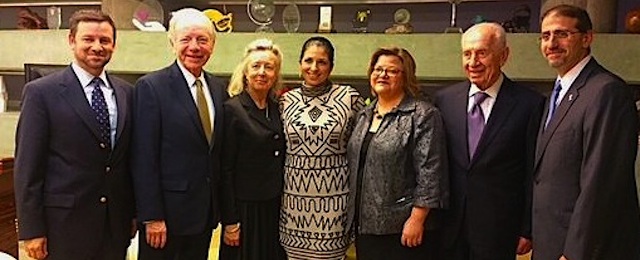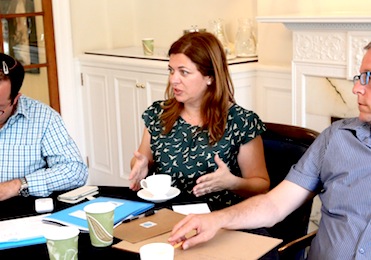
Stepping it up on Israeli-American Jewish Relations
 The Ruderman Family Foundation is working with senior Israeli leadership to strengthen the sense of commitment and responsibility toward the American Jewish community, and seeks to cultivate ties between the world’s two largest Jewish communities. Below is an interview with Limor Rubin, the Ruderman Family Foundation’s lead program officer for Israel-American Jewish relations, about the Foundation’s enhanced efforts to bridge the gap between Israelis and American Jews.
The Ruderman Family Foundation is working with senior Israeli leadership to strengthen the sense of commitment and responsibility toward the American Jewish community, and seeks to cultivate ties between the world’s two largest Jewish communities. Below is an interview with Limor Rubin, the Ruderman Family Foundation’s lead program officer for Israel-American Jewish relations, about the Foundation’s enhanced efforts to bridge the gap between Israelis and American Jews.
RFF: What is the Foundation’s work on relations between Israeli and American Jews. What’s the objective?
Limor: In the past five years the Foundation has invested in efforts to raise awareness in Israel of the importance of the bonds to American Jews. The American Jewish side is worried about the state of the relationship and is investing in efforts to strengthen it, but here in Israel there’s been less of a focus and understanding.
We’ve been testing the waters by, for example, bringing Knesset Members and journalists to the U.S. to learn firsthand about the American Jewish community. We feel we’ve made great strides and that we are ready to take this work to the next level.
Our goal is social change. We want to build a critical mass of Israeli leaders who are committed to partnering on strengthening the Israeli and American Jewish relationship. The events of the past few days represent the next stage of intervention. We are sending a message to Israeli leadership and society that this must be a high priority.
RFF: Tell us about this week’s events.
We’ve just completed the inaugural Ruderman Conference on Israel-American Jewish Relations. It was a series of four high-level events.
The first was a gathering of 30 top professionals who deal with Israel-American Jewish relations in what we call a ‘practical think tank discussion’. The participants include directors of government ministries, directors of Jewish organizations, scholars, diplomats, thought leaders, NGOs, and other foundations.
The Foundation was acting as convener of the network of people working on the issues. We aim to support them as professional community and tap them in planning our future work. Emerging from this gathering will be a policy paper, produced through the University of Haifa’s Ruderman Program, to guide our own strategy and to share with Israel’s key policy designers, influencers, and thinkers.
That same day we held a formal dinner with former President Shimon Peres, former U.S. Senator Joe Lieberman, and U.S. Ambassador Dan Shapiro. We included our primary target audiences – top government and security officials, academics, journalists, business and industry leaders, philanthropists, and public intellectuals.
The next morning, a discussion was convened by the Knesset Caucus for Israel-U.S. relations, the group we helped organize with MK Nachman Shai to support understanding and engagement with the United States among Members of Knesset. Senator Lieberman was the keynote speaker, along with Knesset Speaker Yuli Edelstein and Deputy Speaker Tzachi Hanegbi. More than 150 people from across the political spectrum attended.
And then this afternoon, we held the opening of the third year of the Ruderman Program for American Jewish Studies at Haifa University. It was well attended, and featured a conversation with Senator Lieberman. The Ruderman Program’s intensive concentration on the American Jewish community has already awarded M.A. degress to dozens of promising professionals who spent time visiting the American Jewish community as part of their studies.
RFF: What comes next?
Limor: These events declared to the leading Israeli politicians and personalities: “We’re in business.” Our efforts going forward will be bigger, stronger, and sustained. In the coming weeks and months, we will be actively partnering with key groups and leaders in order to educate a critical mass of the Israeli media, bureaucracy, political class, and academia. More and more, Haifa’s Ruderman Program will provide the scholarly and professional catalyst for this evolution in our programs and in public attitudes.
By exposing and sensitizing this wide spectrum of Israeli society, we hope to see significant change in attitudes and understanding. In future surveys, we’d like to see clear evidence that Israelis understand not just the importance of the U.S. relationship, which they do, but in the critical and indispensable role played by American Jews. How can we in Israel afford to get that wrong?
About the author
Stay Included
To stay up to date on our most recent advocacy efforts, events and exciting developments, subscribe to our newsletter and blog!



















